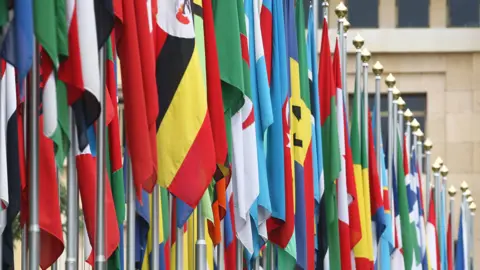What is the United Nations and what does it do?
 Getty Images
Getty ImagesQuestions about international development and how to tackle climate change will top the agenda when the world's leaders meet at the United Nations General Assembly in New York.
The war in Ukraine is also likely to be a major issue.
What is the United Nations and what is its General Assembly?
The United Nations (UN) is an international organisation which was formed in 1945 after the end of World War Two with the aim of maintaining international peace.
It now includes 193 countries that are full members, and two non-member states - the Holy See (an area of Rome under the Pope's jurisdiction) and the State of Palestine.
The UN's General Assembly (UNGA) is the main meeting which decides what the organisation should do. It is the only meeting at which all of the 193 UN members are represented.
The General Assembly takes place every September, at the UN's headquarters in New York.
This year, it started on 5 September. However, most world leaders will turn up for the main meetings which begin on 18 September.
What will be discussed at the UNGA?
A conference on sustainable development takes place on 18 and 19 September, where nations will discuss how to achieve the UN's "sustainable development goals".
These include ending world hunger and poverty, improving incomes and education around the world, and increasing access to clean water and sanitation.
The General Debate takes place from 19 September to 23 September, and continues on 26 September.
In these sessions, representatives from every country in the UN can speak, to raise matters which concern them.
The Climate Ambition Summit takes place on 20 September. Its aim is to speed up action to tackle climate change.
There are also conferences about financing for economic development, dealing with pandemics, and nuclear disarmament.
The president of the UNGA is elected annually, and this year the position is held by Dennis Francis, a diplomat from Trinidad and Tobago.
What could come out of the UN General Assembly?
The UNGA presents a unique opportunity for the world's heads of state and heads of government to meet in one place. It has been described as a "diplomatic speed dating" event.
The most significant outcomes from the UNGA often come from meetings between national leaders held on the sidelines.
Ukrainian President Volodymyr Zelensky is expected to attend, and may make a speech to the UN Security Council about the war in his country.
However, President Vladimir Putin of Russia, China's President Xi Jinping and France's President Emmanuel Macron will not be going. There are reports that the UK Prime Minister Rishi Sunak will also not attend.
How does the UN's General Debate work?
Tradition dictates that the first speaker is always the Brazilian leader, or their representative, followed by the host country, the US.
Brazil kicks off the event because in the assembly's early days when nobody wanted to go first, it often put itself forward as the first speaker, and this then became routine.
During the event, every country's leader, or their representative, will address the assembly. They can use any of the UN's six official languages: Arabic, Chinese, English, French, Russian and Spanish.
Speakers are asked to keep their statements to under 15 minutes, although this is regularly ignored. Cuba's Fidel Castro holds the record for the longest General Assembly speech: four-and-a-half hours, in 1960.
The delegates sit in alphabetical order, according to the English translation of their names, but the country in the first seat is always selected by the UN secretary-general. This year, it is North Macedonia.
What have been some of the most memorable UNGA incidents?
In 2019, Swedish environmental activist Greta Thunberg, who was 16 years old at the time, told world leaders in the UNGA's Climate Action Summit: "You have stolen my dreams and my childhood with your empty words. How dare you?"
In 2017, former US President Donald Trump said of North Korea leader Kim Jong-un: "Rocket Man is on a suicide mission for himself."
In 2009, Libyan leader Colonel Gaddafi spoke for more than an hour and a half, at one point complaining about delegates leaving the conference hall.
He also accused major powers of betraying the principles of the UN Charter, before later throwing a copy of it on to the ground.
In 2006, Venezuelan President Hugo Chavez called then-US President George W Bush "the devil".
He said that the podium, from which Mr Bush had spoken the previous day, "still smells of sulphur".
